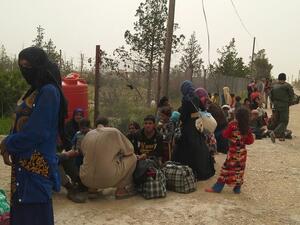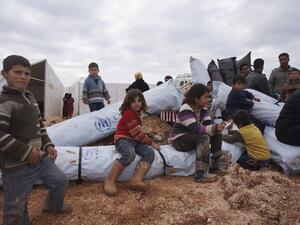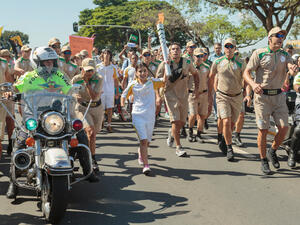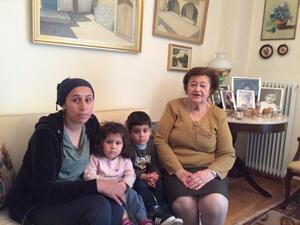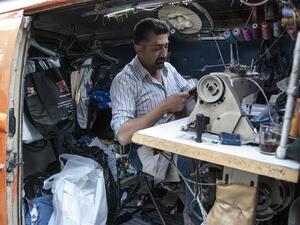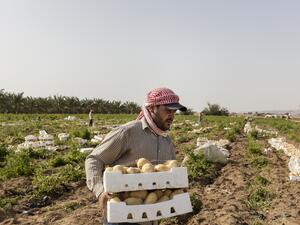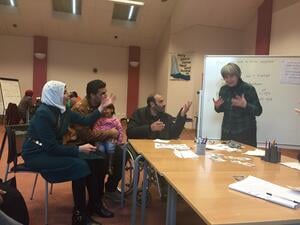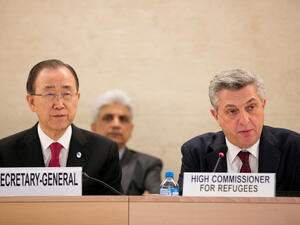Syrians in Jordan: preventing the most vulnerable from falling through the cracks
Syrians in Jordan: preventing the most vulnerable from falling through the cracks

UNHCR community service worker Ameera Faraj tends to the emergency needs of refugees.
AMMAN, Jordan, March 7 (UNHCR) - It's morning and a 70-year-old Syrian man stands outside the UNHCR building in Amman among hundreds of other asylum-seekers. His trousers are dirty. His black shoes, covered in dust, are falling apart. His hands shake uncontrollably, bouncing off his frayed coffee-coloured sweater. His 60-year-old wife helps to keep him standing. A hijab (veil) covers her head.
Heba Azazieh, a senior field associate, sees the couple. At first she thinks the man is suffering from the morning cold, but she soon learns that he's shaking because of the terrible violence he has seen. "May God protect your ears from what we will tell you," the woman says.
She recalls that when the Syrian conflict began in March 2011 tanks rolled through the streets of their home city of Homs. Snipers set up position on rooftops, sending the old man into a fit of convulsive fear. Neighbours said it was not safe to stay and the couple fled, hoping to return in a few days. "We left with the clothes on our back," the old man tells the attentive Azazieh.
Their money was consumed in no time. Three days later, they called their neighbours who told them that armed men had taken over their home. Shells had obliterated the verandah. Everything was lost.
And now they're in real need of help: the old man's UNHCR registration papers are out of date; the local pharmacy will no longer provide him with the medicine that controls his shaking; and there is a problem accessing his monthly cash grant of US$140 from UNHCR. For some reason he can't withdraw money using the ATM card he was given, and it is this cash that keeps them alive.
It's a typical case for UNHCR's Azazieh, who heads up a small response unit designed to listen and act on the emergency needs of refugees like the elderly couple. She quickly renews the man's papers and calls an associate to deal with the bank problem. It may seem simple, but Azazieh and her professional, caring team are providing a vital service.
More than 360,000 Syrians have sought shelter in Jordan and many arrive desperate and in need of urgent medical, material and other assistance. Some, like the old couple, face fresh problems after arrival. UNHCR has supported Jordan in its efforts to coordinate the response to the Syrian crisis and has provided critical goods and services to the displaced.
But doing so is an immense challenge. As insecurity in Syria prevails, thousands of mostly women and children are fleeing to Jordan daily through official and unofficial crossing points. The majority of the exodus is dispersed across urban and rural communities.
Azazieh's team helps those in need from all over the country. No appointment is necessary. Potential emergency cases are referred to the appropriate staff. The objective is to protect the most vulnerable from falling through the cracks. Some of those who do not receive regular assistance suffer from everything from serious medical conditions to sexual violence and exploitation.
On the day that Azazieh, who is Syrian-Jordanian, meets the old couple, there are about 500 other people waiting to be seen. Her job is to direct the flow of misery efficiently. "Cases that we would previously consider as the exception are becoming the norm," she says, gesturing to an area where refugees register. It is packed with older people and the sick as well as single mothers and their children.
Urgent cases are referred to UNHCR's community services team. In the basement of the office, these refugees line up to speak in private with a team of specialists. Ameera Faraj, a community services worker, listens and tries to help as one family after another tell of how their world came to be broken.
In the small interviewing room, Faraj faces a 32-year-old woman with her five children, ranging in age from 10 years to seven months. Her five-year-old daughter has fallen in love with Faraj's computer. Her mother tells her to stop being a nuisance, but Faraj is happy to see the little girl smile. "Don't worry, darling," she says to the mother. "Your little girl is not a problem for me."
The woman and her children live off the US$6 per day that she earns collecting vegetables for local farmers. She lives in a makeshift shelter in the countryside. She has no cooking utensils. She arrived from Syria because she was afraid for the safety of her little ones.
Faraj looks at the youngest boy and her face suddenly turns serious. She examines his hands and feet. She stares at his sunken eyes. "This boy is malnourished," she says. "You need to take him to a health centre immediately." The woman quietly protests. "If I take him to the health centre, I will lose my day's pay," the woman says. "I have five children to feed."
Faraj's tone suddenly turns sharp. This is not a request. "You will take this child to a health centre so that he can receive treatment." she says "You will not save your son from Syria to lose him in Jordan." The woman is given emergency cash assistance to help cover her immediate needs. UNHCR field officers will soon visit her at her home to ensure that her children are going to school and that she is safe. Her eyes well up and she exhales.
The community services worker has no time to rest. As the woman leaves, a man in a wheelchair presses into the room. He too has nothing. He lives on the second floor of a building and must pull his body up the stairs. He needs to pay the rent and his daughter needs to go to school.
Faraj will see as many people as possible today. And when she goes home to her own family she will keep her telephone on. There are women at risk of sexual violence who know how to reach her. She could be needed again. This is the rhythm of her life in an emergency.
By Greg Beals in Amman, Jordan

